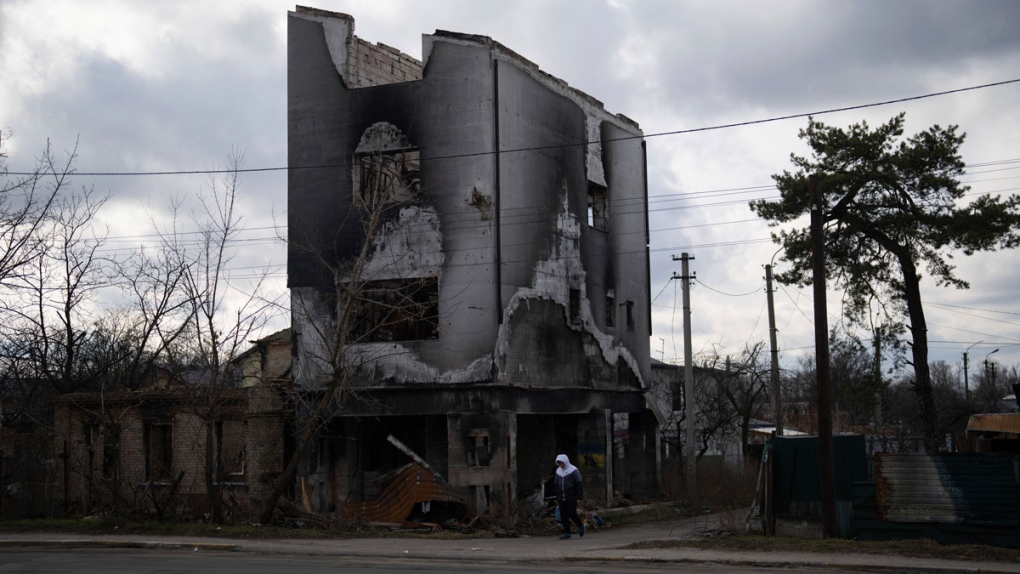
Natasha O'Neill
CTVNews.ca Writer
Updated March 19, 2023
For over a year, women fighting on the front lines of the war in Ukraine have done so without proper equipment, a Ukrainian charity says.
Since Feb. 24, 2022, about 60,000 women have joined the fight against Russia’s illegal invasion of Ukraine, the founders of Zemliachky, a charity aiding female soldiers on the front lines, told CTVNews.ca.
Their military uniforms do not fit properly, their helmets cover their eyes as they slide off their heads, and their boots are too big.
"The most important thing is a military uniform," Karina, a deputy commander on Ukraine's front lines, said in an email to CTVNews.ca. "The uniform that is issued is not always of the right size and as it gets colder, you need to dress in warm and high-quality clothes."
Access to menstruation products are another difficulty these women are facing. Pads and tampons are hard to come by and even more difficult to change when the bathroom is a hole dug in the ground. Here's what Canada is doing to help Ukraine
For three women who emailed CTVNews.ca, the honour of serving their country in its time of need far outweighs the difficulties of daily life on the front lines.
To protect their families, CTVNews.ca has agreed to keep the women's last names private. The quotes below were taken from emails to CTVNews.ca, edited for clarity and translated from Ukrainian.
Access to menstruation products are another difficulty these women are facing. Pads and tampons are hard to come by and even more difficult to change when the bathroom is a hole dug in the ground. Here's what Canada is doing to help Ukraine
For three women who emailed CTVNews.ca, the honour of serving their country in its time of need far outweighs the difficulties of daily life on the front lines.
To protect their families, CTVNews.ca has agreed to keep the women's last names private. The quotes below were taken from emails to CTVNews.ca, edited for clarity and translated from Ukrainian.
VERONIKA: 'FIND HAPPINESS IN THE LITTLE THINGS'
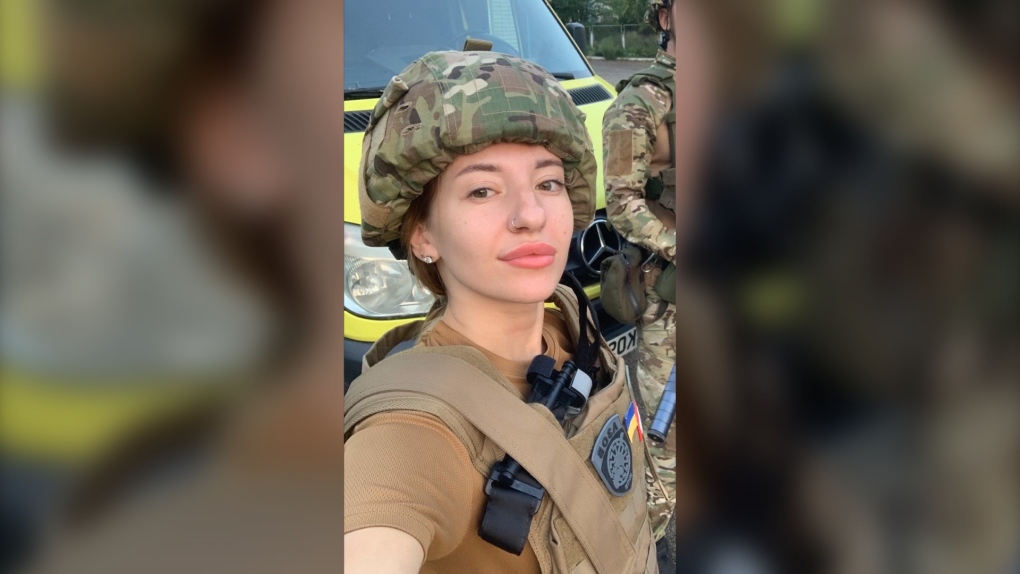
'I got here by accident, but now I can't even imagine myself anywhere else', Veronika told CTVNews.ca (Contributed)
The moment when the war felt real for Veronika was when she was handed a grenade after the Russians made a breakthrough in the Ukrainian defensive line.
"This is instead of captivity," she was told.
The 26-year-old was born in Dnipro and lived in Kyiv when the war broke out. She had just completed an internship and was preparing to become an anesthesiologist.
Each morning she started her day with a cappuccino in a "beautiful cafe" she told CTVNews.ca. However, working on the front lines as a combat medic, Veronika’s morning ritual looks very different.
"Instead of a cappuccino from a cafe in a beautiful cup, I have instant coffee, if I'm lucky, even with cream or milk," she said.
Veronika works in the Azov Division of an artillery unit on the eastern side of Ukraine.
"I provide assistance to soldiers in the field and send them to the hospital if necessary, and teach the basics of tactical medicine," she said. "That's why I went to study to be an anesthesiologist because I like situations where you need to make a quick decision."
Her decision-making skills were needed when she was called to the battlefield to help an injured soldier with a suspected fracture in his neck.
"I ran to him with a stretcher, put on a collar (neck brace), and he was quickly taken to the hospital," Veronika said. "I talked to him all the way. He asked if he was moving his hand, and I said: 'There is a little, come on, you can do it,' although there were no movements at all."
Each day is different for Veronika, but she says she tries to "find happiness in the little things."
The young Ukrainian soldier is stationed outside of the battlefield waiting to be called on for assistance in evacuation and treatment. She is lucky to have an outdoor shower and a hot meal cooked by nearby volunteers.
The moment when the war felt real for Veronika was when she was handed a grenade after the Russians made a breakthrough in the Ukrainian defensive line.
"This is instead of captivity," she was told.
The 26-year-old was born in Dnipro and lived in Kyiv when the war broke out. She had just completed an internship and was preparing to become an anesthesiologist.
Each morning she started her day with a cappuccino in a "beautiful cafe" she told CTVNews.ca. However, working on the front lines as a combat medic, Veronika’s morning ritual looks very different.
"Instead of a cappuccino from a cafe in a beautiful cup, I have instant coffee, if I'm lucky, even with cream or milk," she said.
Veronika works in the Azov Division of an artillery unit on the eastern side of Ukraine.
"I provide assistance to soldiers in the field and send them to the hospital if necessary, and teach the basics of tactical medicine," she said. "That's why I went to study to be an anesthesiologist because I like situations where you need to make a quick decision."
Her decision-making skills were needed when she was called to the battlefield to help an injured soldier with a suspected fracture in his neck.
"I ran to him with a stretcher, put on a collar (neck brace), and he was quickly taken to the hospital," Veronika said. "I talked to him all the way. He asked if he was moving his hand, and I said: 'There is a little, come on, you can do it,' although there were no movements at all."
Each day is different for Veronika, but she says she tries to "find happiness in the little things."
The young Ukrainian soldier is stationed outside of the battlefield waiting to be called on for assistance in evacuation and treatment. She is lucky to have an outdoor shower and a hot meal cooked by nearby volunteers.
KARINA: 'I WAS SCARED, BUT I MANAGED'
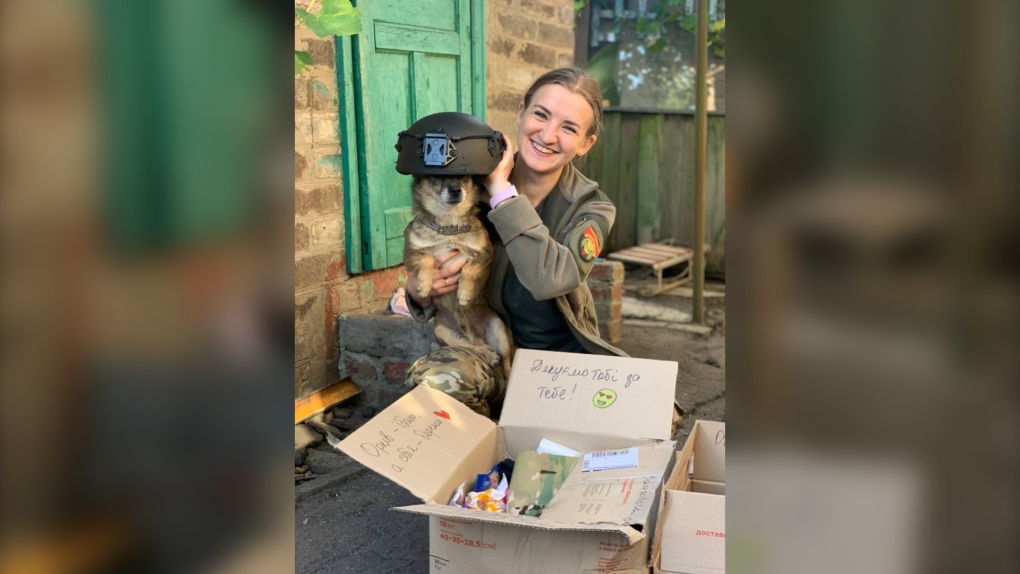
'The war in (Crimea in) 2014 motivated me to join the ranks of the Armed Forces, as my home was on the demarcation line,' Karina said. (Contributed)
The reality of war for Karina is much different. She has been fighting in the Ukraine military since Russia annexed Crimea in 2014.
"I've been here for a year without a rotation, I miss hot water and a normal toilet more than anything," she told CTVNews.ca in an email.
Karina, 26, is a deputy commander for her unit which moves around a lot in the war. The battery, made up of 48 men and two women, build everything: Showers, toilets and structures to sleep in.
Each time the group moves, they abandon the structures and start over.
Karina said she has gotten used to her new reality, but still struggles with taking care of herself. Cystitis, the inflammation of the bladder often caused by a bladder infection or an untreated urinary tract infection, is common among her comrades, she says.
The helmets given to the women are "3 sizes bigger" she said, and the underwear they use are for men.
Karina joined the division when she was 23 years old. The commander of the unit left shortly after, leaving her with about 50 men as her responsibility.
"I was scared, but I managed. I am respected and obeyed," she said.
Her main job is to tell soldiers' loved ones when they have been killed.
"It is tough, and I have to find strength, compassion, and sensitivity," she said.
In August, Karina had to make a difficult phone call to the family of a 23-year-old soldier.
"I called his dad — he didn’t believe me at first," Karina said. "There is a deep pause and it hurts a lot, it's scary. Because you understand what the person on the other end feels."
Karina finds motivation from her unit who she calls her second family. The soldiers working with her are all very different, she says, but still sincere, friendly, bright and cheerful.
She looks towards the future and imagines after the war how she will buy a new home since hers was destroyed on March 15, 2022.
The reality of war for Karina is much different. She has been fighting in the Ukraine military since Russia annexed Crimea in 2014.
"I've been here for a year without a rotation, I miss hot water and a normal toilet more than anything," she told CTVNews.ca in an email.
Karina, 26, is a deputy commander for her unit which moves around a lot in the war. The battery, made up of 48 men and two women, build everything: Showers, toilets and structures to sleep in.
Each time the group moves, they abandon the structures and start over.
Karina said she has gotten used to her new reality, but still struggles with taking care of herself. Cystitis, the inflammation of the bladder often caused by a bladder infection or an untreated urinary tract infection, is common among her comrades, she says.
The helmets given to the women are "3 sizes bigger" she said, and the underwear they use are for men.
Karina joined the division when she was 23 years old. The commander of the unit left shortly after, leaving her with about 50 men as her responsibility.
"I was scared, but I managed. I am respected and obeyed," she said.
Her main job is to tell soldiers' loved ones when they have been killed.
"It is tough, and I have to find strength, compassion, and sensitivity," she said.
In August, Karina had to make a difficult phone call to the family of a 23-year-old soldier.
"I called his dad — he didn’t believe me at first," Karina said. "There is a deep pause and it hurts a lot, it's scary. Because you understand what the person on the other end feels."
Karina finds motivation from her unit who she calls her second family. The soldiers working with her are all very different, she says, but still sincere, friendly, bright and cheerful.
She looks towards the future and imagines after the war how she will buy a new home since hers was destroyed on March 15, 2022.
LISA: 'MANY OF THEM DIED DEFENDING MY HOMETOWN'
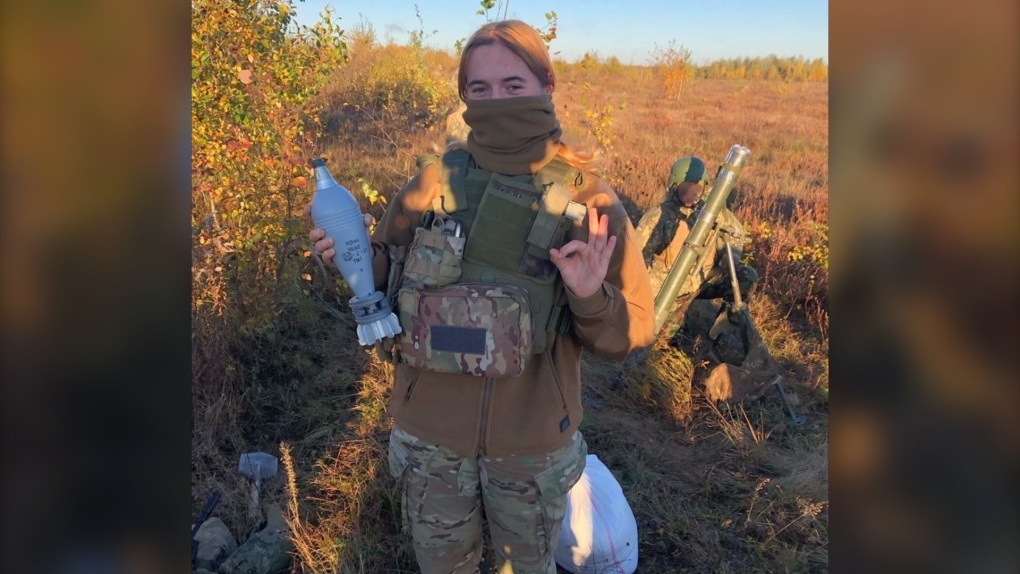
'I worked, studied, walked around the city with friends and enjoyed life. And from February 24 (2022), I immediately began to help, first to civilians in her area, looked in basements, and bought food,' Lisa said. (Contributed)
In a different unit, Lisa, a 21-year-old artillerist, says she is fortunate when she has warm water.
"(There is a) lack of light, water, heat, internet," Lisa told CTVNews.ca in an email. "The toilet is a dug hole, and the shower is water heated over a fire. Often there is no place to wash."
When she is out in the field she packs pads, tampons and pain relief medication in case she is away from camp for a while.
"At first, my fellow soldiers offered me something sweet during my periods, but I said I don’t eat sweets, so now they bring me pickles and tomatoes," she said.
The winter has been bitterly cold. Lisa wears four pairs of socks and sleeps under four summer sleeping bags at night.
She lived in the eastern district of Mariupol, one of the first areas in Ukraine to be shelled. On Feb. 24, 2022, Lisa was woken up at 5 a.m. local time by an explosion and immediately contacted her boyfriend who works in the military.
By April, she had joined the force and knew she wanted to work with mortars, following in her boyfriend's footsteps. She finds motivation from her friends in Azov (a small town north of Mariupol), who instilled in her a love for their country and books.
"Now, many of them died defending my hometown," Lisa said. "Russians destroyed my hometown, killed many civilians, ruined my life so far. Every day, they kill children, women (and) make genocide of my nation."
"And who, if not us, should stop them?" she said.
In a different unit, Lisa, a 21-year-old artillerist, says she is fortunate when she has warm water.
"(There is a) lack of light, water, heat, internet," Lisa told CTVNews.ca in an email. "The toilet is a dug hole, and the shower is water heated over a fire. Often there is no place to wash."
When she is out in the field she packs pads, tampons and pain relief medication in case she is away from camp for a while.
"At first, my fellow soldiers offered me something sweet during my periods, but I said I don’t eat sweets, so now they bring me pickles and tomatoes," she said.
The winter has been bitterly cold. Lisa wears four pairs of socks and sleeps under four summer sleeping bags at night.
She lived in the eastern district of Mariupol, one of the first areas in Ukraine to be shelled. On Feb. 24, 2022, Lisa was woken up at 5 a.m. local time by an explosion and immediately contacted her boyfriend who works in the military.
By April, she had joined the force and knew she wanted to work with mortars, following in her boyfriend's footsteps. She finds motivation from her friends in Azov (a small town north of Mariupol), who instilled in her a love for their country and books.
"Now, many of them died defending my hometown," Lisa said. "Russians destroyed my hometown, killed many civilians, ruined my life so far. Every day, they kill children, women (and) make genocide of my nation."
"And who, if not us, should stop them?" she said.
'THAT'S WHY WE EXIST': HOW ZEMLIACHY IS HELPING
Zemliachky formed a month after the war broke out and posted its first Instagram story showcasing a female soldier.
"Mental health is actually so important, because we communicate with 7000 female soldiers, and it was pretty clear for us that all of them, they need this mental support," Andrey Kolesnyk, co-founder of Zemliachky said. "It's not like you join the army, and you are training somewhere. It's actually war, and all the tragic and awful things that you will surely meet, you will feel and all these deaths, all these murders… It gives you a scar on your mental health."
The organization was created by Kolesnyk and Ksenia Draganyuk who both have ties to aiding women—specifically in the military. Kolesnyk's younger sister and her husband signed up for the military just before the war broke out.
Draganyuk used to be a TV journalist who covered stories of women across Ukraine who held employment in male-dominated fields such as firefighters, police or pilots.
"So we decided to combine the idea of helping and the idea of her (Draganyuk's) show before the war, and we wanted to tell stories about women at the front," Kolesnyk said.
Through short questionnaires, the pair were able to understand who the women at the front lines are and what they need. The organization started sending packages of items the soldiers needed like menstruation products, food and messages of encouragement.
At the start, Zelmiachky sent about 40 packages a month—now it has grown to 50 to 100 parcels a day.
"We do not send the equipment based on just our thoughts, in every box, there are specific items that we know that specific person needs," Draganyuk said in Ukrainian. "We also send them like small things to keep their moral spirit up so they know that back there, there are people that care about them."
As the charity grew so did the demand for female-specific equipment and uniforms. The organization is handling thousands of female soldiers and their needs with a team of 11 people. The demand is constant as the war continues to drag on.
With help from partners around the world, Zemliachky in July started sending female soldiers equipment that fits them.
"Not only (did) society not expect so many women to join the army (but) the government also did not expect that so many females would join the army, that's why it just did not have any possibility to get ready with the female uniforms, the smaller sizes of boots with like lighter equipment," Kolesnyk said. "That's why we exist."
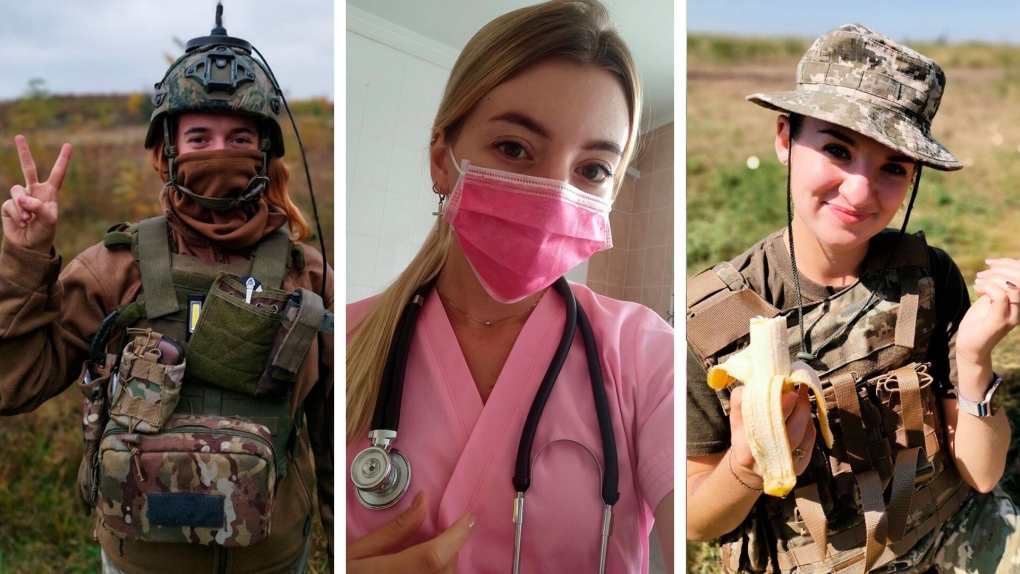
(Left) Lisa, Veronika, Karina are all female soldiers fighting on Ukraine's front lines. (Contributed)
No comments:
Post a Comment